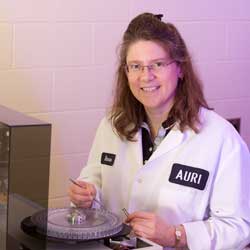
Ranae Jorgenson, analytical chemist at the Agricultural Utilization Research Institute (AURI), was part of a team of researchers awarded the Global Award for Applied Research in the 2012 International Water Association Global Project Innovation Awards. Their winning project explores a process that will make the production of ethanol from corn more economical by reclaiming water from ethanol production process streams.
The International Water Association (IWA) established the Project Innovation Awards to recognize excellence and innovation in water engineering projects throughout the world. Only six global awards are given every two years, and the projects go through a rigorous preliminary round in having to win awards through affiliated organizations worldwide.
The research was led by Iowa State University Professor Hans van Leeuwen. His team is looking at how to create a new fungal product called MycoMeal by cultivating an edible mold, Rhizopus microsporus, on thin stillage from corn-to-ethanol plants, while reclaiming water for reuse, all with significant energy savings. MycoMeal can be used as a highly nutritious animal feed and potentially as a human food supplement.
Jorgenson has been assisting in the research by testing MycoMeal’s nutrition composition for components such as protein, fat, and fatty acids at AURI’s analytical chemistry lab in Marshall. While the research is primarily being conducted at Iowa State, it’s applicable to Minnesota ethanol plants because of the opportunities to make ethanol production more economical, Jorgenson explains.
“Collaboration among researchers is essential to the innovation process, and we’re excited that Ranae is able to lend her skills to this award-winning project,” says Rod Larkins, AURI senior director of science and technology. “Our mission at AURI is to find new uses for Minnesota’s agriculture commodities in order to strengthen our state’s economy and create new jobs. Making ethanol production more economical and sustainable is important to the future of agriculture in Minnesota.”
